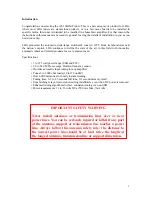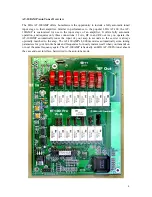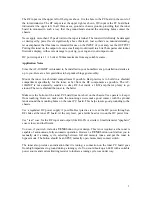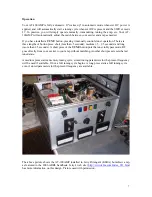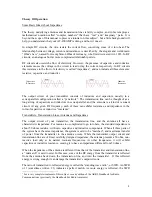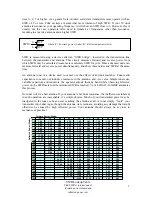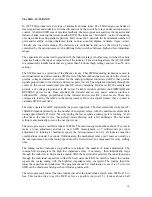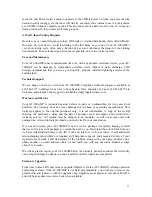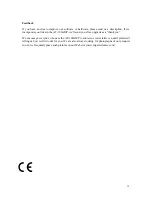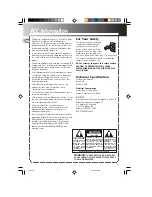
9
rises to 2, 3 or higher. As a general rule, modern solid state transmitters must operate with an
SWR of 2 or less. Tube exciters are somewhat more tolerant of high SWR. If your 50 ohm
antenna is resonant at your operating frequency, it will show an SWR close to 1. However, this is
usually not the case; operators often need to transmit at frequencies other than resonance,
resulting in a reactive antenna and a higher SWR.
F
R
F
R
SWR
/
1
/
1
−
+
=
SWR is measured using a device called an “SWR bridge”, inserted in the transmission line
between the transmitter and antenna. This circuit measures forward and reverse power from
which SWR may be calculated (some meters calculate SWR for you). More advanced units can
measure forward and reverse power simultaneously, and show these values and SWR at the same
time.
An antenna tuner is a device used to cancel out the effects of antenna reactance. Tuners add
capacitance to cancel out inductive reactance in the antenna, and vice versa. Simple tuners use
variable capacitors and inductors; the operator adjusts them by hand while observing reflected
power on the SWR meter until a minimum SWR is reached. Your LDG AT-100AMP automates
this process.
No tuner will fix a bad antenna. If your antenna is far from resonance, the inefficiencies inherent
in such operation are inescapable; it’s simple physics. Much of your transmitted power may be
dissipated in the tuner as heat, never reaching the antenna at all. A tuner simply “fools” your
transmitter into behaving as though the antenna were resonant, avoiding any damage that might
otherwise be caused by high reflected power. Your antenna should always be as close to
resonance as practical.
where F = Forward power (watts), R = Reflected power (watts)
SWR Lookup Table
Find SWR at intersection of
forward power column and
reflected power row
.
Forward Power (Watts)
20
30
40
50
60
70
80
90
100
2
1.92
1.70
1.58
1.50
1.45
1.41
1.38
1.35
1.33
4
2.62
2.15
1.92
1.79
1.70
1.63
1.58
1.53
1.50
6
3.42
2.62
2.26
2.06
1.92
1.83
1.75
1.70
1.65
8
4.44
3.14
2.62
2.33
2.15
2.02
1.92
1.85
1.79
10
5.83
3.73
3.00
2.62
2.38
2.22
2.09
2.00
1.92
12
7.87
4.44
3.42
2.92
2.62
2.41
2.26
2.15
2.06
14
11.24
5.31
3.90
3.25
2.87
2.62
2.44
2.30
2.20
16
17.94
6.42
4.44
3.60
3.14
2.83
2.62
2.46
2.33
18
37.97
7.87
5.08
4.00
3.42
3.06
2.80
2.62
2.47
20
-
9.90
5.83
4.44
3.73
3.30
3.00
2.78
2.62
22
-
12.92
6.74
4.94
4.07
3.55
3.21
2.96
2.77
24
-
17.94
7.87
5.51
4.44
3.83
3.42
3.14
2.92
26
-
27.96
9.32
6.17
4.85
4.12
3.65
3.32
3.08
28
-
57.98
11.24
6.95
5.31
4.44
3.90
3.52
3.25
30
-
-
13.93
7.87
5.83
4.79
4.16
3.73
3.42
32
-
-
17.94
9.00
6.42
5.18
4.44
3.95
3.60
34
-
-
24.63
10.40
7.09
5.60
4.75
4.19
3.80
36
-
-
37.97
12.20
7.87
6.07
5.08
4.44
4.00
38
-
-
77.99
14.60
8.80
6.60
5.44
4.71
4.21
40
-
-
-
17.94
9.90
7.19
5.83
5.00
4.44
42
-
-
-
22.96
11.24
7.87
6.26
5.31
4.68
44
-
-
-
31.30
12.92
8.65
6.74
5.65
4.94
46
-
-
-
47.98
15.08
9.56
7.27
6.02
5.22
48
-
-
-
97.99
17.94
10.63
7.87
6.42
5.51
50
-
-
-
-
21.95
11.92
8.55
6.85
5.83
Reflected Power (Watts)



